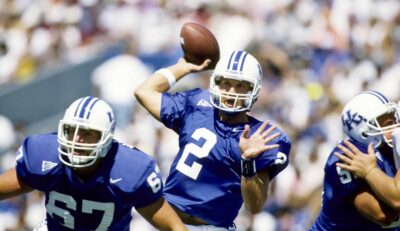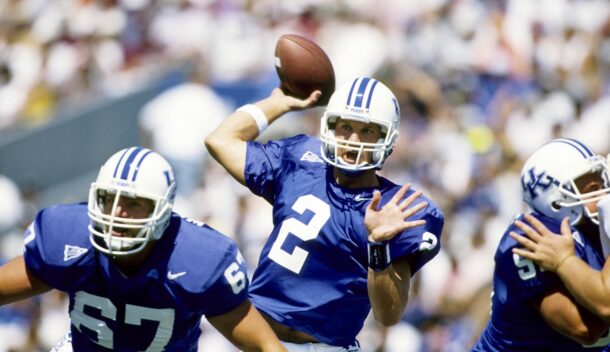At times last season, Justin Worley resembled a piñata more than a college quarterback.
Not that Worley was terrible, but a leaky offensive line and his lack of athleticism led to 29 sacks in just 7 games. Ole Miss smacked the quarterback around as if Worley was a Floyd Mayweather sparring partner before a big pay-per-view fight.
Tennessee shut him down before the end of that game, electing to start Nathan Peterman against Alabama before turning to Joshua Dobbs. No thoughtful analyst thought to dub Dobbs “The Plumber,” but his insertion sure did close off some leaky valves.
The Vols didn’t drink some sort of magic potion between the first and second quarters of the Alabama game (akin to the good guys in “Space Jam”). But, with Dobbs entering for Peterman, Tennessee ran for 115 yards against the Tide in the second quarter alone.
The team finished the season 4-1 from there, rushing for 334 yards against South Carolina, 214 against Kentucky and 283 against Iowa in the TaxSlayer Bowl.
Dobbs averaged more than 78 rushing yards per game, and that’s including negative sack yardage. Since then, the Vols have added JUCO transfer (and former Alabama signee) Alvin Kamara, rated as a five-star player by247Sports.
Then there’s Jalen Hurd, who ran for 899 yards as a true freshman. During the final five-game stretch, he topped 100 rushing yards three times. That’s no coincidence, I suspect.
Dobbs’ presence forced defenses to read and react rather than attack, as college quarterbacks who are dangerous runners often do. The offensive line and the running backs both benefit from his escapability, and as Dobbs develops as a passer, he’ll take even more pressure off those two units.
As a result, Tennessee could be in position to accomplish something that may be an SEC first — three 700-yard rushers in the same season. No SEC team has accomplished that since ’08, for sure. The Arkansas backfields of Darren McFadden, Felix Jones and Peyton Hillis never came close. Coach Gus Malzahn’s Auburn teams haven’t come close, either. It’s possible it’s never been done.
But, even if Dobbs runs less often, he should top 700 rushing yards in 2015. And if Hurd and Kamara share the workload, at least to an extent, it’s very possible both could top 700 rushing yards as well. I think it will happen.
For context, 2,100 rushing yards in a season is more than six entire SEC teams produced during the ’14 season. That sort of production from Tennessee’s triple-threat rushing attack, which the Vols will attempt to prime with very fast tempo and some read-option, could propel UT into contention in the SEC East.
The offensive line needs to get better — it allowed the most sacks in the conference last year, and Hurd’s freshman season was better than his numbers indicate. But the group will benefit from cohesion.
Tennessee’s cross-division opponents, Alabama and Arkansas, won’t make it easy. Both are (and will be) very, very good against the run, as is Missouri.
But running the ball against Georgia could neutralize the Bulldogs’ challenging pass rush. Against Florida, it’ll help avoid what could be the best trio of cornerbacks in the SEC in 2015. And the Vols will look to push the ball on the ground against every non-conference foe as well as South Carolina, Kentucky and Vanderbilt.
Build some late leads in those games and the three-headed monster can pad its stats, and the offensive line can gain confidence.
Auburn’s Nick Marshall helped Tre Mason and then Cameron Artis-Payne lead the SEC in rushing the last two years, forcing defenders to sell out against the quarterback or the running back. Dobbs and Tennessee’s two primary ball-carriers will do the same, challenging defenses in 2015.
An itinerant journalist, Christopher has moved between states 11 times in seven years. Formally an injury-prone Division I 800-meter specialist, he now wanders the Rockies in search of high peaks.







